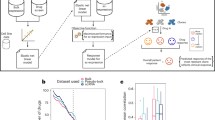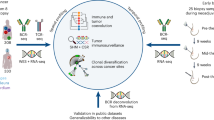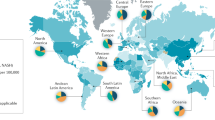Abstract
Integrins (ITGs) are key elements in cancer biology, regulating tumor growth, angiogenesis and lymphangiogenesis through interactions of the tumor cells with the microenvironment. Moving from the hypothesis that ITGs could have different effects in stage II and III colon cancer, we tested whether a comprehensive panel of germline single-nucleotide polymorphisms (SNPs) in ITG genes could predict stage-specific time to tumor recurrence (TTR). A total of 234 patients treated with 5-fluorouracil-based chemotherapy at the University of Southern California were included in this study. Whole-blood samples were analyzed for germline SNPs in ITG genes using PCR–restriction fragment length polymorphism or direct DNA sequencing. In the multivariable analysis, stage II colon cancer patients with at least one G allele for ITGB3 rs4642 had higher risk of recurrence (hazard ratio (HR)=4.027, 95% confidence interval (95% CI) 1.556–10.421, P=0.004). This association was also significant in the combined stage II–III cohort (HR=1.975, 95% CI 1.194–3.269, P=0.008). The predominant role of ITGB3 rs4642 in stage II diseases was confirmed using recursive partitioning, showing that ITGB3 rs4642 was the most important factor in stage II diseases. In contrast, in stage III diseases the combined analysis of ITGB1 rs2298141 and ITGA4 rs7562325 allowed to identify three distinct prognostic subgroups (P=0.009). The interaction between stage and the combined ITGB1 rs2298141 and ITGA4 rs7562325 on TTR was significant (P=0.025). This study identifies germline polymorphisms in ITG genes as independent stage-specific prognostic markers for stage II and III colon cancer. These data may help to select subgroups of patients who may benefit from ITG-targeted treatments.
This is a preview of subscription content, access via your institution
Access options
Subscribe to this journal
Receive 6 print issues and online access
$259.00 per year
only $43.17 per issue
Buy this article
- Purchase on Springer Link
- Instant access to full article PDF
Prices may be subject to local taxes which are calculated during checkout



Similar content being viewed by others
References
Kuebler JP, Wieand HS, O'Connell MJ, Smith RE, Colangelo LH, Yothers G et al. Oxaliplatin combined with weekly bolus fluorouracil and leucovorin as surgical adjuvant chemotherapy for stage II and III colon cancer: results from NSABP C-07. J Clin Oncol. 2007; 25: 2198–2204.
André T, Boni C, Navarro M, Tabernero J, Hickish T, Topham C et al. Improved overall survival with oxaliplatin, fluorouracil, and leucovorin as adjuvant treatment in stage II or III colon cancer in the MOSAIC trial. J Clin Oncol. 2009; 27: 3109–3116.
International Multicentre Pooled Analysis of Colon Cancer Trials (IMPACT) investigators. Efficacy of adjuvant fluorouracil and folinic acid in colon cancer. International Multicentre Pooled Analysis of Colon Cancer Trials (IMPACT) investigators. Lancet 1995; 345: 939–944.
Roth AD, Tejpar S, Delorenzi M, Yan P, Fiocca R, Klingbiel D et al. Stage-specific prognostic value of molecular markers in colon cancer: Results of the translational study on the PETACC 3-EORTC 40993-SAKK 60-00 trial (abstract). J Clin Oncol (Meeting Abstract) 2009; 27: 4002.
Sargent DJ, Marsoni S, Monges G, Thibodeau SN, Labianca R, Hamilton SR et al. Defective mismatch repair as a predictive marker for lack of efficacy of fluorouracil-based adjuvant therapy in colon cancer. J Clin Oncol 2010; 28: 3219–3226.
Avraamides CJ, Garmy-Susini B, Varner JA . Integrins in angiogenesis and lymphangiogenesis. Nat Rev Cancer 2008; 8: 604–617.
Páez D, Labonte MJ, Bohanes P, Zhang W, Benhanim L, Ning Y et al. Cancer dormancy: a model of early dissemination and late cancer recurrence. Clin Cancer Res 2012; 18: 645–653.
Takada Y, Ye X, Simon S . The integrins. Genome Biol 2007; 8: 215.
Schwartz MA, Ginsberg MH . Networks and crosstalk: integrin signalling spreads. Nat Cell Biol 2002; 4: E65–E68.
Alam N, Goel HL, Zarif MJ, Butterfield JE, Perkins HM, Sansoucy BG et al. The integrin-growth factor receptor duet. J Cell Physiol 2007; 213: 649–653.
Liu Z, Wang F, Chen X . Integrin alpha(v)beta(3)-Targeted Cancer Therapy. Drug Dev Res 2008; 69: 329–339.
Barkan D, Chambers AF . β1-integrin: a potential therapeutic target in the battle against cancer recurrence. Clin Cancer Res 2011; 17: 7219–7223.
McShane LM, Altman DG, Sauerbrei W, Taube SE, Gion M, Clark GM et al. Reporting recommendations for tumor marker prognostic studies. J Clin Oncol 2005; 23: 9067–9072.
Lee PH, Shatkay H . F-SNP: computationally predicted functional SNPs for disease association studies. Nucleic Acids Res 2008; 36: D820–D824.
Lee PH, Shatkay H . An integrative scoring system for ranking SNPs by their potential deleterious effects. Bioinformatics 2009; 25: 1048–1055.
Winder T, Bohanes P, Zhang W, Yang D, Power DG, Ning Y et al. GRP78 promoter polymorphism rs391957 as potential predictor for clinical outcome in gastric and colorectal cancer patients. Ann Oncol 2011; 22: 2431–2439.
Conneely KN, Boehnke M . So many correlated tests, so little time! Rapid adjustment of p values for multiple correlated tests. Am J Hum Genet 2007; 81: 1158–1168.
Garmy-Susini B, Avraamides CJ, Schmid MC, Foubert P, Ellies LG, Barnes L et al. Integrin alpha4beta1 signaling is required for lymphangiogenesis and tumor metastasis. Cancer Res 2010; 70: 3042–3051.
Qian F, Vaux DL, Weissman IL . Expression of the integrin alpha 4 beta 1 on melanoma cells can inhibit the invasive stage of metastasis formation. Cell 1994; 77: 335–347.
Park J, Song SH, Kim TY, Choi MC, Jong HS, Kim TY et al. Aberrant methylation of integrin alpha4 gene in human gastric cancer cells. Oncogene 2004; 23: 3474–3480.
Karmakar S, Mukherjee R . Integrin receptors and ECM proteins involved in preferential adhesion of colon carcinoma cells to lung cells. Cancer Lett 2003; 196: 217–227.
Lee EJ, Lee BB, Han J, Cho EY, Shim YM, Park J et al. CpG island hypermethylation of E-cadherin (CDH1) and integrin alpha4 is associated with recurrence of early stage esophageal squamous cell carcinoma. Int J Cancer 2008; 123: 2073–2079.
Stoeltzing O, Liu W, Reinmuth N, Fan F, Parry GC, Parikh AA et al. Inhibition of integrin alpha5beta1 function with a small peptide (ATN-161) plus continuous 5-FU infusion reduces colorectal liver metastases and improves survival in mice. Int J Cancer 2003; 104: 496–503.
Stallmach A, von Lampe B, Orzechowski HD, Matthes H, Riecken EO . Increased fibronectin-receptor expression in colon carcinoma-derived HT 29 cells decreases tumorigenicity in nude mice. Gastroenterology 1994; 106: 19–27.
Varner JA, Emerson DA, Juliano RL . Integrin alpha 5 beta 1 expression negatively regulates cell growth: reversal by attachment to fibronectin. Mol Biol Cell 1995; 6: 725–740.
Chen YQ, Trikha M, Gao X, Bazaz R, Porter AT, Timar J et al. Ectopic expression of platelet integrin alphaIIb beta3 in tumor cells from various species and histological origin. Int J Cancer 1997; 72: 642–648.
Hosotani R, Kawaguchi M, Masui T, Koshiba T, Ida J, Fujimoto K et al. Expression of integrin alphaVbeta3 in pancreatic carcinoma: relation to MMP-2 activation and lymph node metastasis. Pancreas 2002; 25: e30–e35.
Trikha M, Zhou Z, Timar J, Raso E, Kennel M, Emmell E et al. Multiple roles for platelet GPIIb/IIIa and alphavbeta3 integrins in tumor growth, angiogenesis, and metastasis. Cancer Res 2002; 62: 2824–2833.
Vellon L, Menendez JA, Lupu R . AlphaVbeta3 integrin regulates heregulin (HRG)-induced cell proliferation and survival in breast cancer. Oncogene 2005; 24: 3759–3773.
Karadag A, Fedarko NS, Fisher LW . Dentin matrix protein 1 enhances invasion potential of colon cancer cells by bridging matrix metalloproteinase-9 to integrins and CD44. Cancer Res 2005; 65: 11545–11552.
Conti JA, Kendall TJ, Bateman A, Armstrong TA, Papa-Adams A, Xu Q et al. The desmoplastic reaction surrounding hepatic colorectal adenocarcinoma metastases aids tumor growth and survival via alphav integrin ligation. Clin Cancer Res 2008; 14: 6405–6413.
Trikha M, Timar J, Zacharek A, Nemeth JA, Cai Y, Dome B et al. Role for beta3 integrins in human melanoma growth and survival. Int J Cancer 2002; 101: 156–167.
Verbisck NV, Costa ET, Costa FF, Cavalher FP, Costa MD, Muras A et al. ADAM23 negatively modulates alpha(v)beta(3) integrin activation during metastasis. Cancer Res 2009; 69: 5546–5552.
Choi JS, Kim KH, Jeon YK, Kim SH, Jang SG, Ku JL et al. Promoter hypermethylation of the ADAM23 gene in colorectal cancer cell lines and cancer tissues. Int J Cancer 2009; 124: 1258–1262.
Dedhar S, Saulnier R, Nagle R, Overall CM . Specific alterations in the expression of alpha 3 beta 1 and alpha 6 beta 4 integrins in highly invasive and metastatic variants of human prostate carcinoma cells selected by in vitro invasion through reconstituted basement membrane. Clin Exp Metastasis 1993; 11: 391–400.
Sampson-Johannes A, Wang W, Shtivelman E . Colonization of human lung grafts in SCID-hu mice by human colon carcinoma cells. Int J Cancer 1996; 65: 864–869.
Takatsuki H, Komatsu S, Sano R, Takada Y, Tsuji T . Adhesion of gastric carcinoma cells to peritoneum mediated by alpha3beta1 integrin (VLA-3). Cancer Res 2004; 64: 6065–6070.
Pontes-Júnior J, Reis ST, de Oliveira LC, Sant’anna AC, Dall'oglio MF, Antunes AA et al. Association between integrin expression and prognosis in localized prostate cancer. Prostate 2010; 70: 1189–1195.
Kreidberg JA . Functions of alpha3beta1 integrin. Curr Opin Cell Biol 2000; 12: 548–553.
Hashida H, Takabayashi A, Tokuhara T, Taki T, Kondo K, Kohno N et al. Integrin alpha3 expression as a prognostic factor in colon cancer: association with MRP-1/CD9 and KAI1/CD82. Int J Cancer 2002; 97: 518–525.
Yu JJ, Lee KB, Mu C, Li Q, Abernathy TV, Bostick-Bruton F et al. Comparison of two human ovarian carcinoma cell lines (A2780/CP70 and MCAS) that are equally resistant to platinum, but differ at codon 118 of the ERCC1 gene. Int J Oncol 2000; 16: 555–560.
Sauna ZE, Kimchi-Sarfaty C, Ambudkar SV, Gottesman MM . Silent polymorphisms speak: how they affect pharmacogenomics and the treatment of cancer. Cancer Res 2007; 67: 9609–9612.
Mandola MV, Stoehlmacher J, Zhang W, Groshen S, Yu MC, Iqbal S et al. A 6 bp polymorphism in the thymidylate synthase gene causes message instability and is associated with decreased intratumoral TS mRNA levels. Pharmacogenetics 2004; 14: 319–327.
Acknowledgements
This work was funded by the Lanni Family Charitable Foundation and by the P30 CA P30 CA014089-27S1 grant. AG is supported in part by a research grant from the Austrian Society of Hematology and Oncology, the Bank Austria Visiting Scientists Program and the ‘Verein fuer Krebskranke’ of the Medical University Graz. Statement of translational relevance: In the era of personalized treatments, the identification of prognostic biomarkers in early stages of colon cancer is of critical importance for risk-adapted treatments/follow-up and for drug development. Recent data have shown that meaningful biomarkers may not be similar in stage II or in stage III colon cancer. In this study, we identified ITG variants that give stage-specific prognostic information, identifying patients at higher risk of tumor recurrence. Our data shows that ITGB3 is relevant is stage II colon cancer and suggest that drugs under development targeting this pathway should be tested in this setting. In contrast, our data support a leading role for the α4β1 heterodimer in stage III colon cancer, which is of major importance for future drug development. Furthermore, the variants identified in this study could predict benefit from agents targeting these pathways.
Author information
Authors and Affiliations
Corresponding author
Ethics declarations
Competing interests
The authors declare no conflict of interest.
Additional information
Disclaimer
The manuscript is solely the work of the authors stated. Neither the submitted paper nor any similar paper, in whole or in part has been submitted, published or is in press in any other scientific journal. All authors have read and approved all versions of the manuscript, its content and its submission.
Supplementary Information accompanies the paper on the The Pharmacogenomics Journal website
Supplementary information
Rights and permissions
About this article
Cite this article
Bohanes, P., Yang, D., Loupakis, F. et al. Integrin genetic variants and stage-specific tumor recurrence in patients with stage II and III colon cancer. Pharmacogenomics J 15, 226–234 (2015). https://doi.org/10.1038/tpj.2014.66
Received:
Revised:
Accepted:
Published:
Issue Date:
DOI: https://doi.org/10.1038/tpj.2014.66
This article is cited by
-
Genetic variants associated with colorectal brain metastases susceptibility and survival
The Pharmacogenomics Journal (2017)



